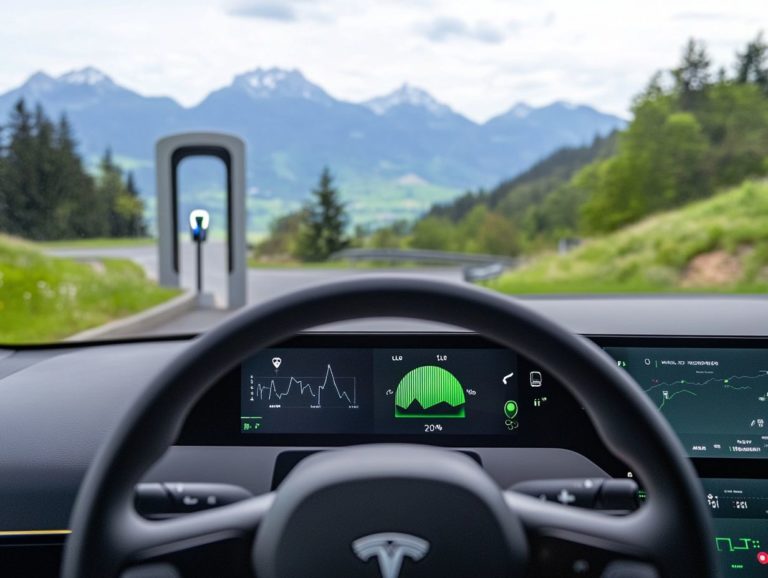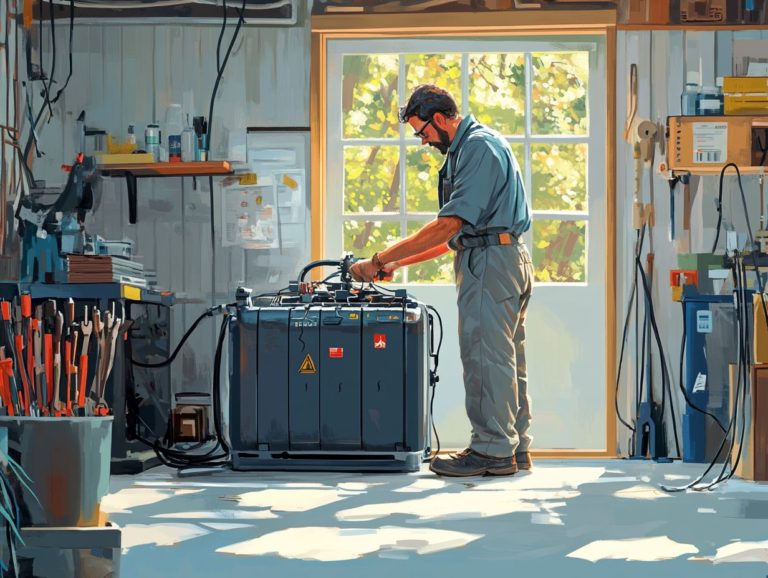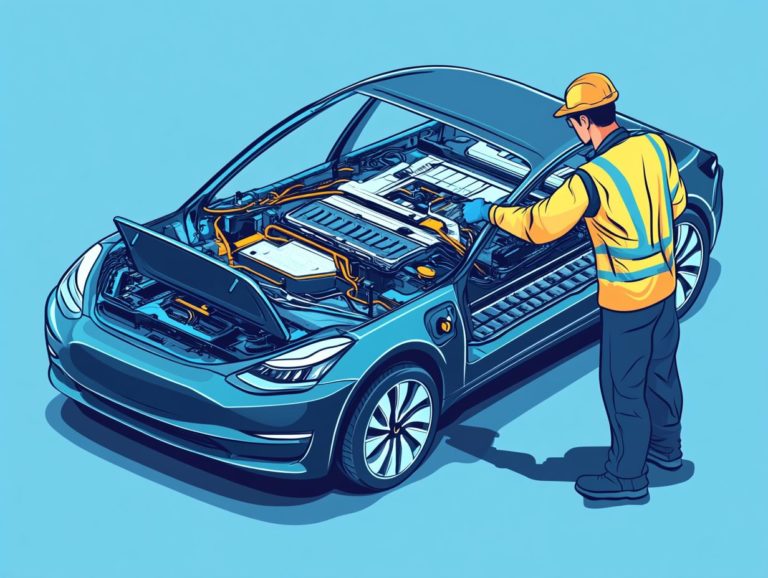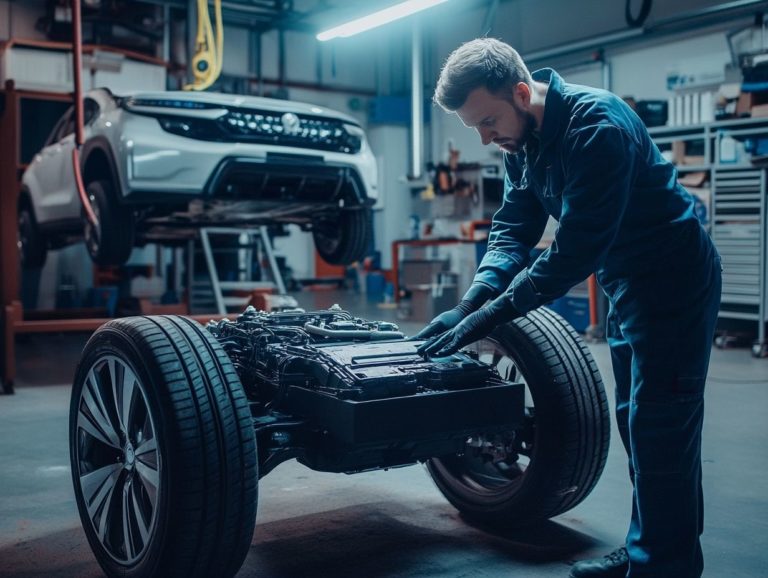how to safely maintain your ev at home
Maintaining your electric vehicle (EV) goes beyond ensuring it runs. It’s vital for your safety, efficiency, and your vehicle’s lifespan.
From checking tire pressure to knowing your brake systems, regular maintenance is key to optimal performance.
This guide offers essential upkeep tips, weighs the pros and cons of DIY versus professional services, and highlights common pitfalls to avoid.
Whether you re a seasoned EV enthusiast or just starting your journey, these insights will empower you to keep your vehicle in prime condition.
Contents
- Key Takeaways:
- Regular Maintenance Tasks
- DIY vs Professional Maintenance
- Tips for Safely Maintaining Your EV at Home
- Common Maintenance Mistakes to Avoid
- Frequently Asked Questions
- Are there any specific safety precautions to take when maintaining an electric vehicle at home?
- Should I get help from a mechanic for complex maintenance tasks on my electric vehicle?
- How often should I perform maintenance on my electric vehicle?
Key Takeaways:
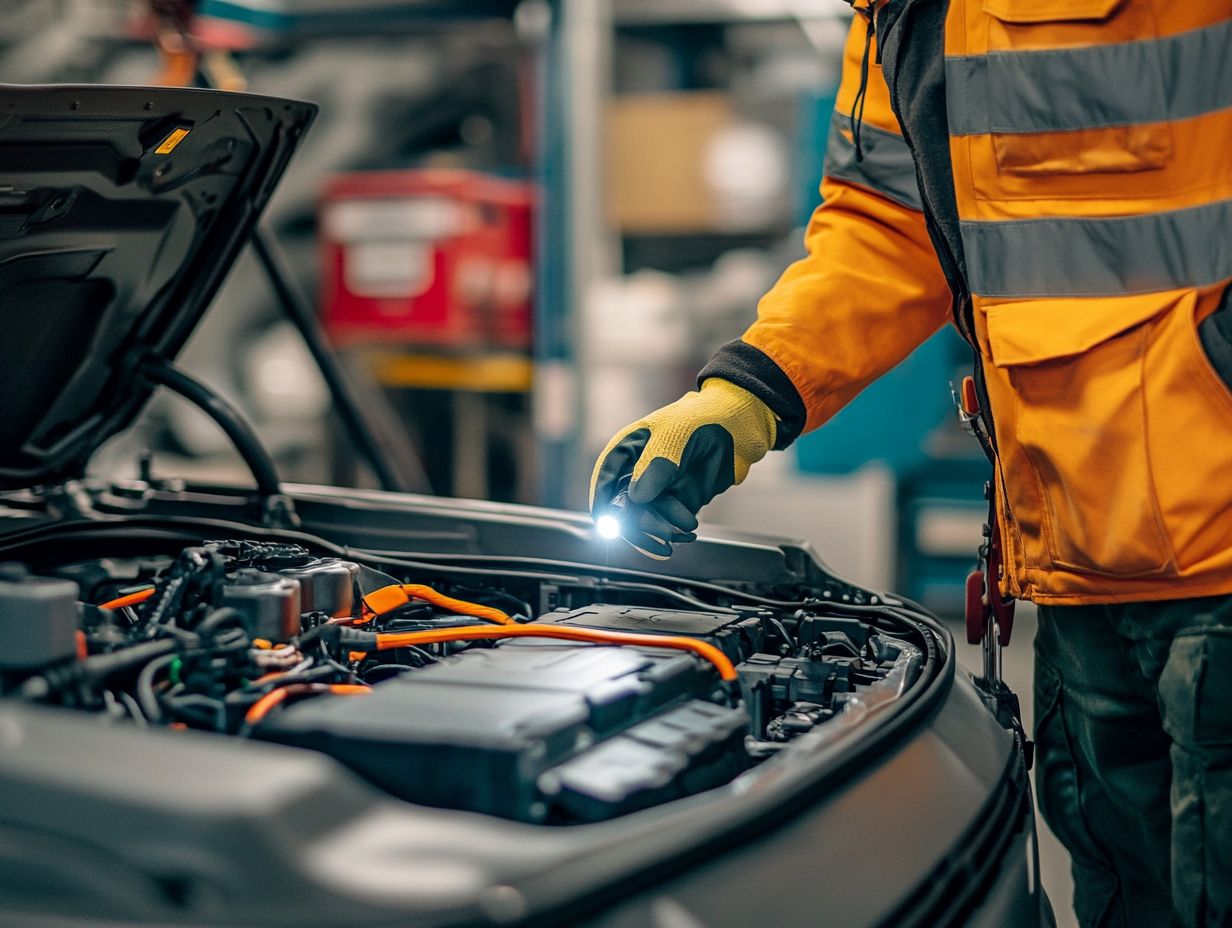
Regular maintenance is crucial for the safety and longevity of your EV. Don’t neglect it.
DIY maintenance can save you money, but be aware of the risks. Consider professional help for complex tasks.
Follow safety precautions, have the necessary tools, and carefully follow step-by-step guides, including tips for properly storing your EV, for successful maintenance at home.
Why Maintenance is Important
Understanding maintenance for electric vehicles is essential for their longevity, performance, and safety. A crucial aspect is keeping your EV ready for emergencies, as a proactive maintenance approach is necessary, just like with traditional vehicles.
Key elements include battery care and essential components. Ignoring these areas can lead to faster battery wear and may void your warranty.
Following a maintenance schedule helps you extend your battery’s lifespan and enhance safety. Regular checks, like monitoring tire pressure and inspecting brakes, prevent minor issues from becoming costly repairs.
Creating a vehicle-specific timeline for your EV model can optimize performance and maximize your investment benefits. You ll also contribute to a more sustainable future.
Regular Maintenance Tasks
Regular maintenance tasks involve essential checks to ensure optimal performance and safety.
Conduct routine inspections to ensure critical components, like the battery and cooling system, function well.
Using a comprehensive maintenance checklist such as tire rotations and brake fluid checks improves your driving experience and prolongs your vehicle’s life.
Tire Pressure and Rotation
Maintaining proper tire pressure and regular tire rotations is vital for your EV’s performance and safety. Pay attention to tire care to boost performance and ensure safe driving.
The condition of your tires affects how smoothly you navigate various terrains. Low tire pressure increases energy use, reducing mileage. Neglecting tire rotations leads to uneven wear, affecting traction and stability.
Check your tire pressure at least once a month, ideally when tires are cold. Rotate tires every 5,000 to 7,500 miles or as your manual suggests.
These simple practices enhance your safety and contribute to your electric vehicle’s longevity and efficiency.
Brakes and Fluids
Brakes and fluid maintenance are vital for safety and performance. This is especially true for electric vehicles, which have unique regenerative braking systems that set them apart from traditional friction brakes.
Unlike conventional vehicles that rely solely on brake pads and rotors, electric vehicles employ a dual braking system that smartly combines regenerative and conventional braking. This cutting-edge technology enhances energy efficiency and minimizes wear on brake components, ultimately extending their lifespan.
Regular inspections are essential to guarantee that both regenerative and friction components are operating effectively. It s important for owners to be proactive in checking and maintaining brake fluid levels, as well as other crucial fluids, since fluctuations can significantly affect braking performance.
Establishing a routine maintenance schedule and being attentive to any unusual sounds can help you catch potential issues early, ensuring your vehicle remains in peak condition.
Battery Maintenance
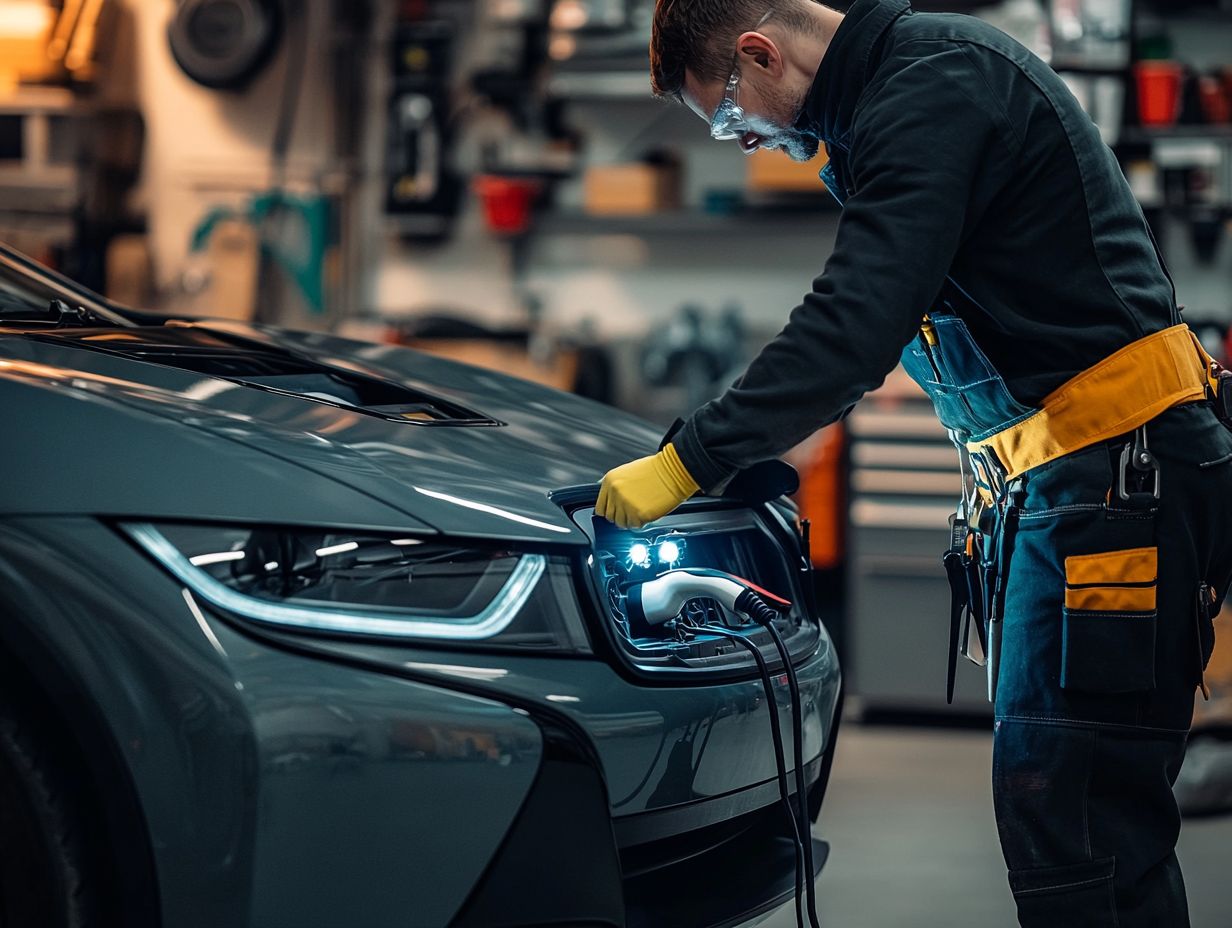
Battery maintenance is crucial for your electric vehicle. It can significantly affect your battery life and performance. By investing time in proper battery care, you re not just enhancing the cycle life of your powerful battery; you’re also playing a crucial role in staving off battery degradation over time.
To ensure your battery functions at its best, regular checks of charge levels and temperature are essential. Experts suggest keeping your charge between 20% and 80% to maximize longevity. Using fast-charging stations sparingly can extend your battery’s lifespan. In fact, industry statistics indicate that adhering to these best practices can boost cycle life by up to 30%.
As recycling policies gain traction, many manufacturers are emphasizing responsible disposal. By following these guidelines, you’re not just protecting your investment; you’re also championing sustainable practices that help reduce environmental impact.
DIY vs Professional Maintenance
When maintaining your electric vehicle, you can choose DIY or professional services. Engaging in DIY maintenance can save you money and provide a rewarding sense of accomplishment. However, opting for professional maintenance offers you the advantage of expert knowledge and specialized tools, ensuring that you comply with the manufacturer’s suggested maintenance and preserve your vehicle warranty.
Ultimately, the decision hinges on your priorities and comfort level with the intricacies of your electric vehicle.
Pros and Cons of Each Option
Evaluating the pros and cons of DIY maintenance versus professional maintenance for electric vehicles is essential to making a decision that truly aligns with your needs and comfort level.
Opting for DIY maintenance can be a cost-effective choice that empowers you to take control of your vehicle’s upkeep. On the other hand, professional maintenance provides specialized expertise, particularly for the intricate systems in electric vehicles.
If you choose the DIY route, you could discover significant savings in labor costs that can really add up over time, making it an attractive option for hands-on individuals. However, this approach requires a certain level of experience and confidence. Not all maintenance tasks are suitable for DIY attempts, especially those involving high-voltage systems or complex components.
Conversely, professional maintenance offers convenience and peace of mind. Trained technicians possess the necessary knowledge to effectively address complex issues. However, this convenience comes with its own drawbacks, such as higher costs and potentially longer wait times for service appointments.
It s important to weigh your skills and the complexities of the tasks at hand against the value of relying on professional support.
Tips for Safely Maintaining Your EV at Home
For electric vehicle owners planning to tackle maintenance at home, adhering to safety guidelines and utilizing the appropriate equipment is paramount for effective and secure procedures, especially when it comes to maintaining your EV’s electrical system.
Whether you’re conducting routine inspections or diving into more intricate maintenance tasks, grasping the essential tools and safety measures can help you avert accidents while ensuring your vehicle operates at its peak performance.
Equipment and Tools Needed
Having the right equipment and tools is essential for anyone diving into DIY maintenance on electric vehicles. It boosts the effectiveness of your maintenance efforts and prioritizes your safety.
With the proper tools at your disposal, you can check tire pressure, which is vital for optimal performance and safety. Fluid inspection kits help you monitor essential automotive fluids, ensuring that levels are just right for efficient operation. Specialized battery maintenance tools can extend your battery’s lifespan by checking for corrosion and keeping connections clean.
Each of these tools plays a crucial role in maintaining your electric vehicle. Following safety guidelines is equally important to prevent accidents or injuries. Familiarizing yourself with best practices for keeping your EV clean protects your vehicle and creates a safer environment for you during maintenance.
Step-by-Step Guide to Basic Maintenance
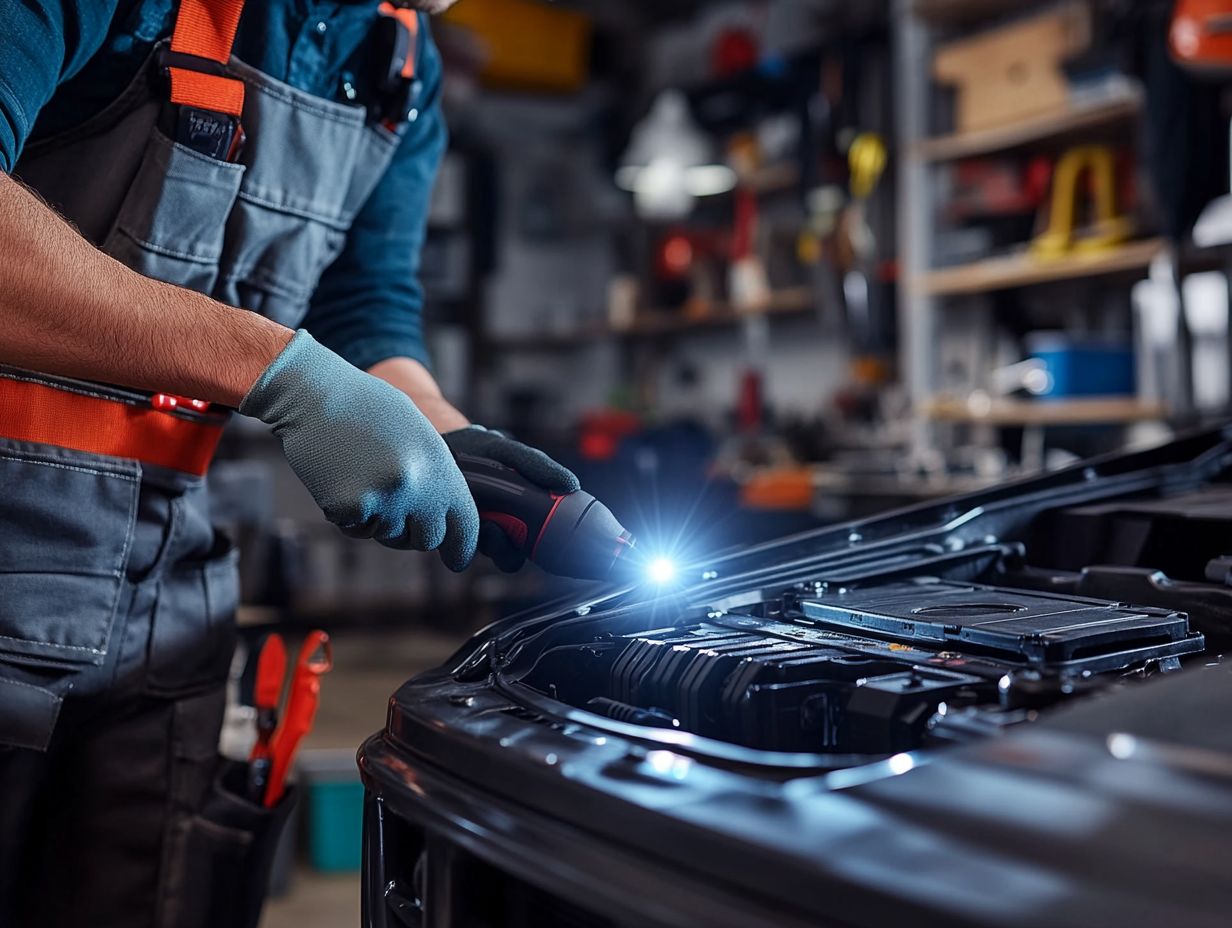
A step-by-step guide to basic maintenance empowers you as an electric vehicle owner to conduct routine checks and tasks with confidence. This ensures both the longevity and safety of your vehicle. This essential guide to EV maintenance shines a light on fundamental aspects of EV upkeep, such as tire pressure checks, battery inspections, and fluid levels.
Embracing a structured approach to upkeep significantly reduces unexpected issues while enhancing efficiency. Regularly check tire pressure to improve grip and lower energy consumption. Keep an eye on battery health for optimal range, and monitor fluid levels to ensure all systems operate smoothly.
Always use software updates provided by the manufacturer; these updates enhance performance features and safety measures. Establishing and sticking to a consistent maintenance routine safeguards against larger, costly repairs in the future and elevates your overall driving experience!
Common Maintenance Mistakes to Avoid
Avoiding common maintenance mistakes is essential for you as an electric vehicle owner to ensure your car operates safely and efficiently.
Simple oversights, like neglecting routine inspections for fluids and brakes or not adhering to proper battery care guidelines, can lead to significant issues later on, impacting both performance and longevity.
Prioritizing these maintenance tasks will help you enjoy a smoother, more reliable driving experience.
Potential Consequences and How to Prevent Them
Neglecting maintenance on your electric vehicle can lead to far-reaching consequences that impact everything from battery life to overall performance. By understanding these potential issues and implementing preventative measures, you can ensure optimal function and safety for your EV.
When maintenance slides off your to-do list, problems like battery degradation can emerge, resulting in reduced range and longer charging times. Components such as brakes and tires may wear down more rapidly, putting vehicle safety and handling at risk.
To sidestep these headaches, prioritize regular checks. Monitor battery health, maintain proper tire pressure, and inspect brake systems regularly.
Adhering to the manufacturer s maintenance guidelines not only extends your vehicle’s lifespan but also protects against potential accidents caused by neglected components. By making these practices a priority, you can enjoy a reliable and efficient driving experience!
Frequently Asked Questions
What is an electric vehicle (EV)?
An electric vehicle, or EV, is a car powered by an electric motor instead of a traditional gasoline engine. They use electricity stored in batteries for power.
Why is it important to safely maintain your EV at home?
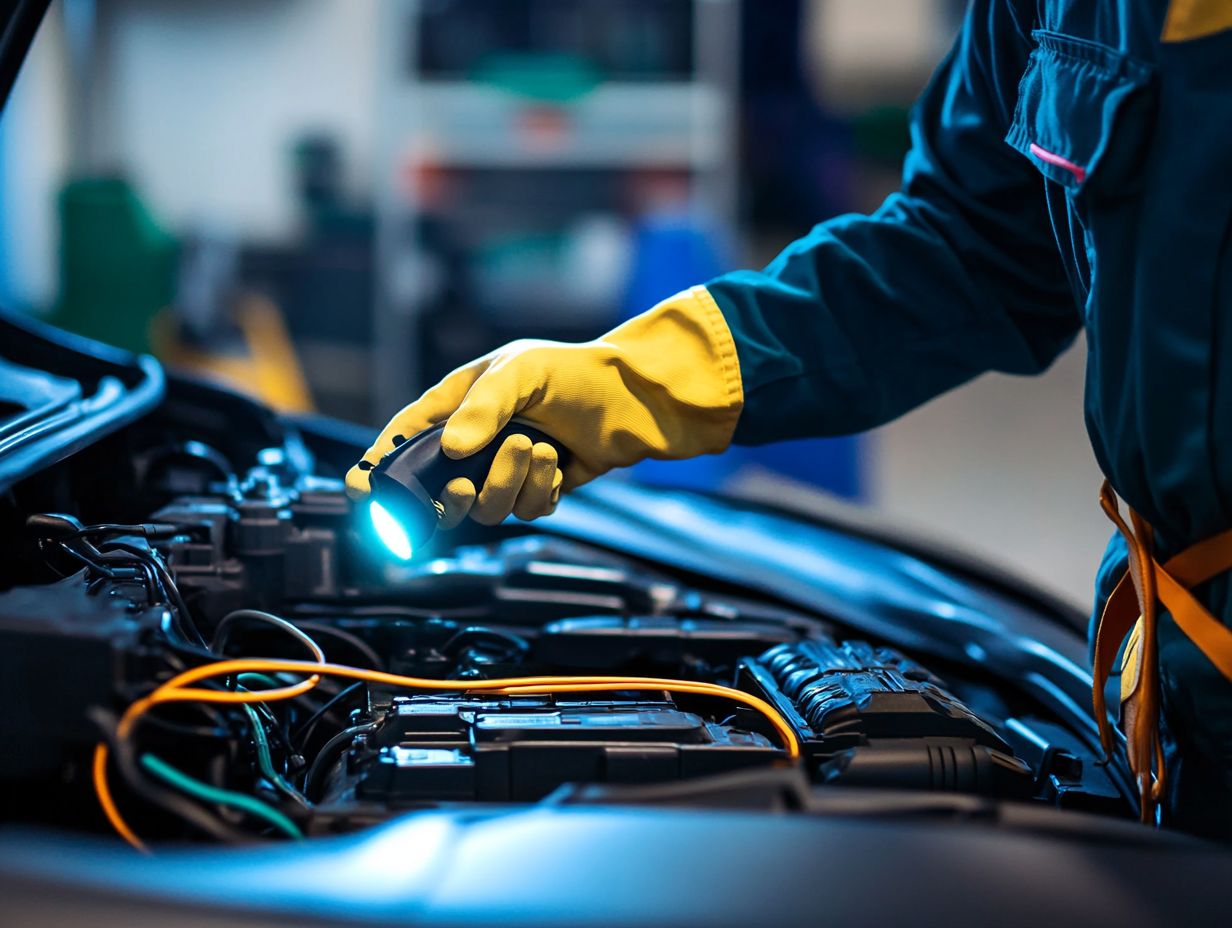
Proper maintenance is essential for keeping your EV running smoothly and safely. Following the best practices for EV battery maintenance helps your EV operate efficiently and prolongs its life!
What are some basic maintenance tasks for EVs that can be done at home?
Some basic maintenance tasks for EVs that can be done at home include checking and topping off the coolant and windshield washer fluid, changing the cabin air filter, and inspecting the tires for wear and proper inflation. For more detailed advice, check out these tips for keeping your EV in top shape.
Are there any specific safety precautions to take when maintaining an electric vehicle at home?
Yes, always follow safety precautions. Wear protective gear like gloves and safety glasses, and make sure the car is turned off and unplugged before starting any maintenance tasks.
Should I get help from a mechanic for complex maintenance tasks on my electric vehicle?
If you lack experience or the right tools, it s best to get professional help. This ensures the job is done correctly and safely.
How often should I perform maintenance on my electric vehicle?
You ll want to keep your EV in top shape! Refer to the owner s manual for specific guidelines.
As a general rule, perform basic maintenance every 6-12 months and more complex tasks every 1-2 years.


